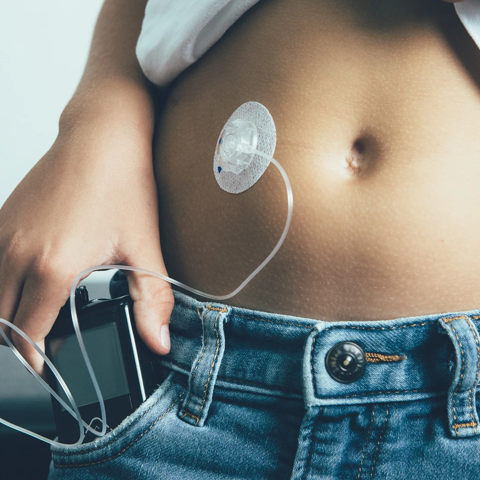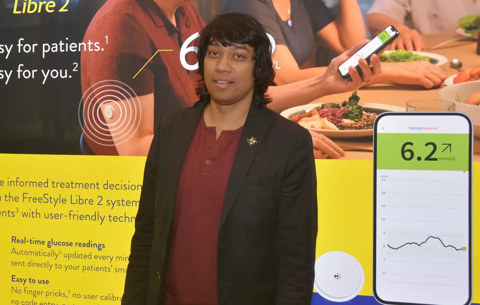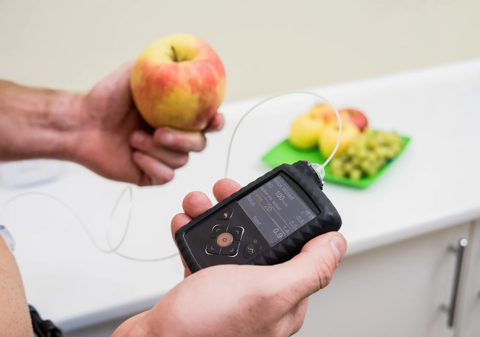
Groundbreaking artificial pancreas device to be available on the NHS
Hybrid closed loop system could change lives for people living with type 1 diabetes.
Tens of thousands people living with type 1 diabetes across England are set to receive an “artificial pancreas” in a world-first initiative being rolled out by the NHS.
The groundbreaking device continually monitors a person’s blood glucose, then automatically adjusts the amount of insulin given to them through a pump.
NHS systems across England will start identifying eligible people living with type 1 diabetes who health chiefs believe could benefit from the hybrid closed loop system – sometimes called an artificial pancreas – from today. There are currently 269,095 people living in England with type 1 diabetes.
In addition, north of the border, the Scottish Intercollegiate Guidelines Network (SIGN) have also published guidelines recommending increased diabetes technology access for people with type 1 diabetes.
People living with type 1 diabetes using the technology will no longer need to inject themselves with insulin and be able to rely on technology to receive this life saving medication.
This can also help prevent life-threatening hypoglycaemic and hyperglycaemia attacks (low and high blood glucose levels), which can lead to seizures, coma or even death for people living with type 1 diabetes.
NHS England has provided local health systems with £2.5 million so they are ready to start identifying patients that can benefit.
The mass rollout of the artificial pancreas builds on a successful pilot of the technology by NHS England, which saw 835 adults and children with type 1 diabetes given devices to improve the management of their condition.
Each year, the NHS in England currently spends around £10 billion a year – around 10% of its entire budget – on identifying and treating diabetes.
Dr Clare Hambling, National Clinical Director for diabetes said: “This is another example of the NHS leading the way in healthcare, rolling out these groundbreaking devices across England over the next 5 years.
“This transformative technology holds the power to redefine the lives of those with type 1 diabetes, promising a better quality of life as well as clinical outcomes.
“Type 1 diabetes is an easily missed diagnosis so if you are concerned about symptoms – the 4Ts – going to the toilet, passing urine more frequently, with thirst, feeling tired and getting thinner (losing weight), please come forward for support.”

Picture: Dr Partha Kar at United Through Diabetes
Professor Partha Kar, NHS national speciality advisor for diabetes, said: “The national roll out of hybrid closed loop systems is great news for everyone with type 1 diabetes.
“The device detects your glucose levels, transmits the readings to the delivery system, known as the pump, which then initiates the process of determining the required insulin dosage.
“This futuristic technology not only improves medical care but also enhances the quality of life for those affected”.
The National Institute of Health Care and Excellence (NICE) approved the NHS’s roll-out of the technology in December 2023.
Since the NICE announcement, NHS England has published a five-year implementation strategy, which sets out a timeline for how local systems will provide the hybrid closed loop system for eligible patients from 1st April 2024.
NICE recommends the devices should be rolled out to children and young people under 18 with type 1 diabetes, pregnant women with type 1 diabetes, and adults with type 1 diabetes who have an HbA1c of 58 mmol/mol (7.5%) or higher.
In addition to England, the NICE guidance will also apply in Wales, with NHS Wales having also agreed a five-year period to roll out hybrid closed loop following the appraisal, with more information anticipated.

Northern Ireland has also adopted the guidance, with ongoing discussions on how it can be implemented there.
Health Minister Andrew Stephenson said: “People living with type 1 diabetes face the constant stress of needing to monitor their blood glucose levels to stay healthy and avoid complications. This new technology will ease the burden on patients and allow them to manage their condition more easily, without needing to draw blood or wear a continuous glucose monitor.
“This is a great example of how we are harnessing the latest technology to make people’s lives better; improving outcomes, reducing serious complications, and making care simpler.”
The hybrid closed loop system has dramatically changed the everyday life of Gemma Lavery, 38, from Plymouth. She received an artificial pancreas as part of the NHS pilot and calls the technology a “game changer” that allowed her to find a sense of normality.
Gemma said: “I no longer have to worry about work related stress affecting my blood glucose levels as the closed loop helps to sort this out before it becomes a problem.
“I can have a full night sleep without worrying about regular low glucose levels hindering my morning routine and I have found that my diabetes is more stable.”
Les Watson, 64, from West Devon also received an artificial pancreas from the NHS. Les has been living with type one diabetes for nearly 44 years and experienced all of the technological changes in treatment first hand over that period.
Les said: “The user interface is clean, clear and straightforward to grasp, the information that is required by a pump user is readily available and not tucked away somewhere deep in a stacked menu.
“The system is not overloaded with complicated options making its day-to-day use quick and easy. As a user I now spend hardly any time interacting with the system other than at mealtimes or telling it I’m heading out to exercise.”
More than 228,000 people in Scotland are estimated to be living with diabetes, with people with type 1 diabetes accounting for 12% of those living with the condition.
SIGN’s new guidelines recommend significant access to diabetes tech for those with type 1 diabetes, including: making single-hormone hybrid closed loop systems available to all patients; offering CGM (continuous glucose monitoring) to all adults, children and young people with type 1 diabetes; and considering the continuation of CGM and/or continuous subcutaneous insulin infusion in hospitalised patients with diabetes without cognitive impairment.
In addition the Dexcom G7 CGM system is now capable of connecting directly to Apple Watch via its own dedicated Bluetooth connection, making it the first and only CGM system that can offer real-time glucose readings on a smartwatch without people with diabetes needing to carry their phones. The Dexcom G7 and Apple Watch connectivity was created based on the latest people with diabetes’ and healthcare practitioners’ feedback - ultimately giving people with diabetes even more control.
Read more about type 1 diabetes
I would like to make a regular donation of
I would like to make a single donation of
There are lots of ways to raise money to support
people living with all forms of diabetes.
Bake, Swim, Cycle, Fly ... Do It For DRWF!
Fundraise with us
Recent News


